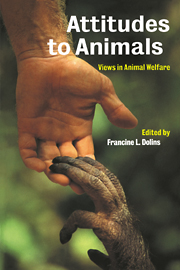Book contents
- Frontmatter
- Contents
- List of contributors
- Acknowledgements
- Part I Attitudes to animals
- Part II Animal awareness
- Part III Animal welfare
- 9 Animal welfare: the concept of the issues
- 10 New perspectives on the design and management of captive animal environments
- 11 Should we let them go?
- Part IV Research and education
- Part V Epilogue: the future of wild animals
- Index
9 - Animal welfare: the concept of the issues
Published online by Cambridge University Press: 16 November 2009
- Frontmatter
- Contents
- List of contributors
- Acknowledgements
- Part I Attitudes to animals
- Part II Animal awareness
- Part III Animal welfare
- 9 Animal welfare: the concept of the issues
- 10 New perspectives on the design and management of captive animal environments
- 11 Should we let them go?
- Part IV Research and education
- Part V Epilogue: the future of wild animals
- Index
Summary
Introduction
The first part of this chapter concerns the concept of animal welfare. A definition of welfare is presented and then discussed in relation to other relevant concepts such as stress and animals' needs and feelings. In the final section of this chapter, there is a discussion of the circumstances in which welfare can be poor and where this is perceived by the general public to pose ethical problems.
Requirements for a definition of animal welfare
Welfare is a term which is restricted to animals including man. It is regarded as particularly important by many people but requires strict definition if it is to be used effectively and consistently. A clearly defined concept of welfare is needed for use in precise scientific measurements, in legal documents and in public statements or discussion. If animal welfare is to be compared in different situations or evaluated in a specific situation, it must be assessed in an objective way. The assessment of welfare should be quite separate from any ethical judgement but, once an assessment is completed, it should provide information which can be used to take decisions about the ethics of a situation.
An essential criterion for a useful definition of animal welfare is that it must refer to a characteristic of the individual animal rather than something given to the animal by man. The welfare of an individual may well improve as a result of something given to it, but the thing given is not itself welfare.
- Type
- Chapter
- Information
- Attitudes to AnimalsViews in Animal Welfare, pp. 129 - 142Publisher: Cambridge University PressPrint publication year: 1999
- 9
- Cited by



